Analyzing the Future of Accounting Jobs: Tech, Skills & Ethics
VerifiedAdded on 2024/05/31
|16
|3742
|377
Report
AI Summary
This report examines the evolving accounting sector in Australia, focusing on the impact of technological innovations like Artificial Intelligence (AI) and accounting software automation on accounting skills, ethics, and future career opportunities. It highlights how AI enhances decision-making, data analysis, and strategic management for accountants, while automation improves efficiency and fraud detection. The report also addresses ethical considerations, emphasizing the need to protect client data and maintain ethical standards in the face of increased data access and automated processes. Furthermore, it discusses how these technological advancements are reshaping career paths in accounting, requiring professionals to adapt to new roles focused on strategy and decision support, and the evolving demand for new skills in the accounting industry.
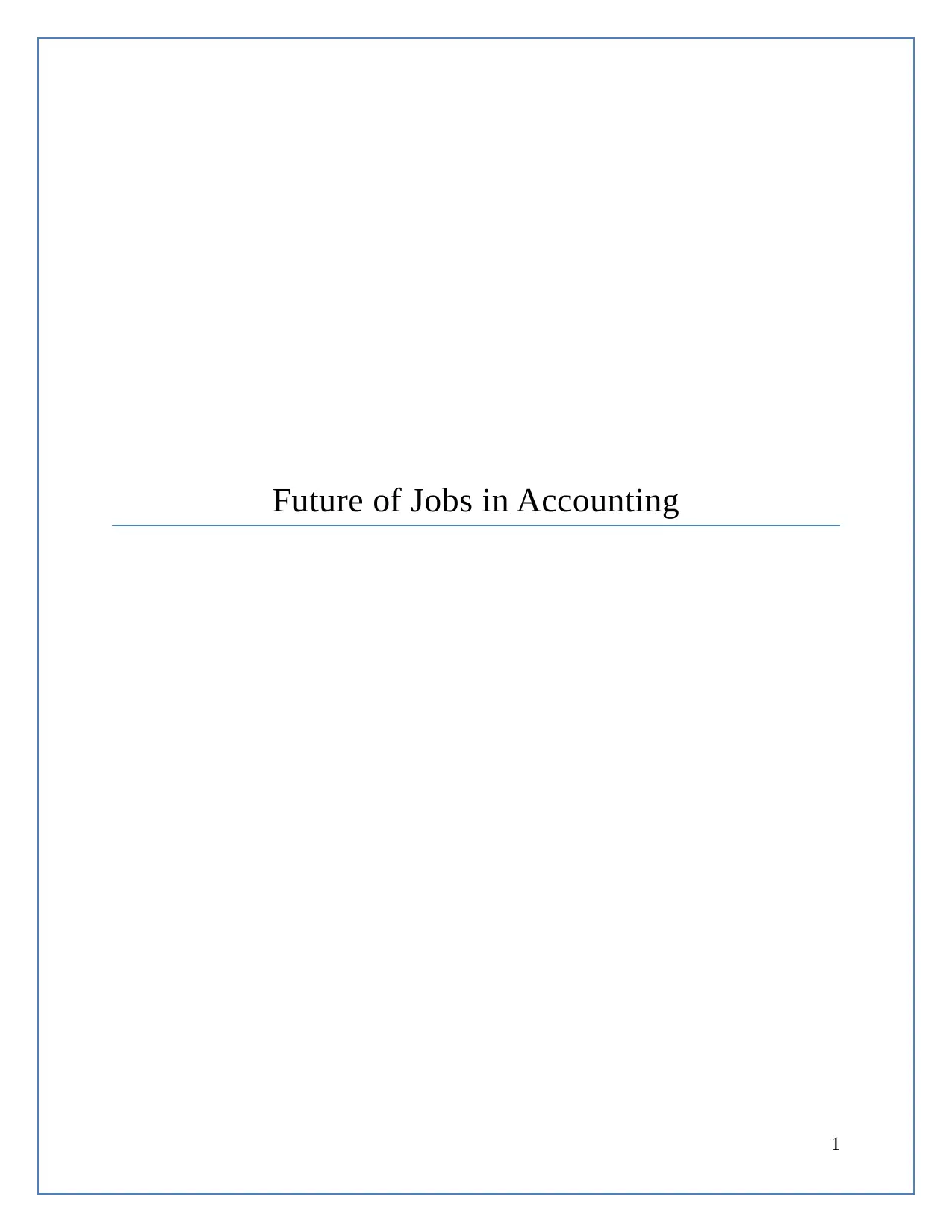
Future of Jobs in Accounting
1
1
Paraphrase This Document
Need a fresh take? Get an instant paraphrase of this document with our AI Paraphraser
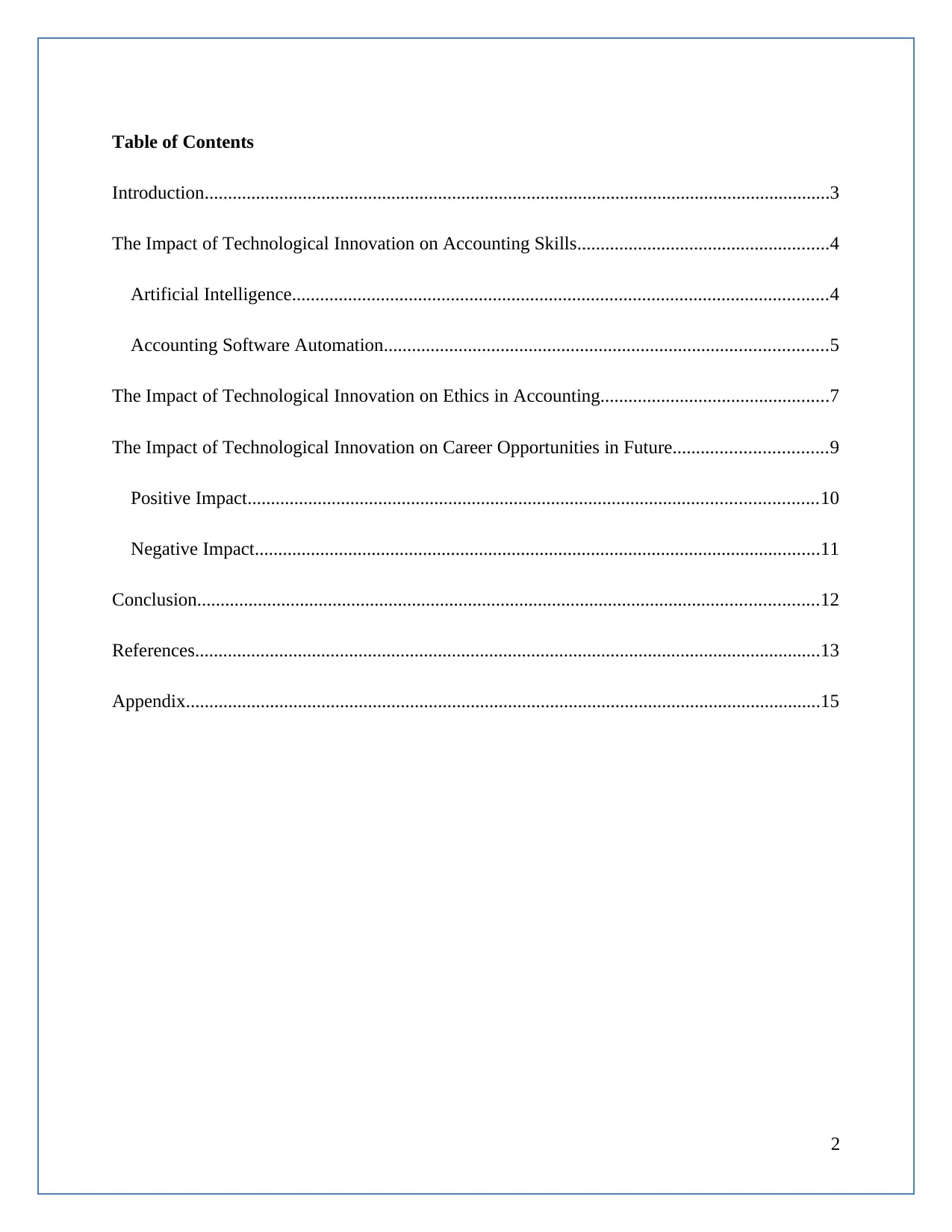
Table of Contents
Introduction......................................................................................................................................3
The Impact of Technological Innovation on Accounting Skills......................................................4
Artificial Intelligence...................................................................................................................4
Accounting Software Automation...............................................................................................5
The Impact of Technological Innovation on Ethics in Accounting.................................................7
The Impact of Technological Innovation on Career Opportunities in Future.................................9
Positive Impact..........................................................................................................................10
Negative Impact.........................................................................................................................11
Conclusion.....................................................................................................................................12
References......................................................................................................................................13
Appendix........................................................................................................................................15
2
Introduction......................................................................................................................................3
The Impact of Technological Innovation on Accounting Skills......................................................4
Artificial Intelligence...................................................................................................................4
Accounting Software Automation...............................................................................................5
The Impact of Technological Innovation on Ethics in Accounting.................................................7
The Impact of Technological Innovation on Career Opportunities in Future.................................9
Positive Impact..........................................................................................................................10
Negative Impact.........................................................................................................................11
Conclusion.....................................................................................................................................12
References......................................................................................................................................13
Appendix........................................................................................................................................15
2
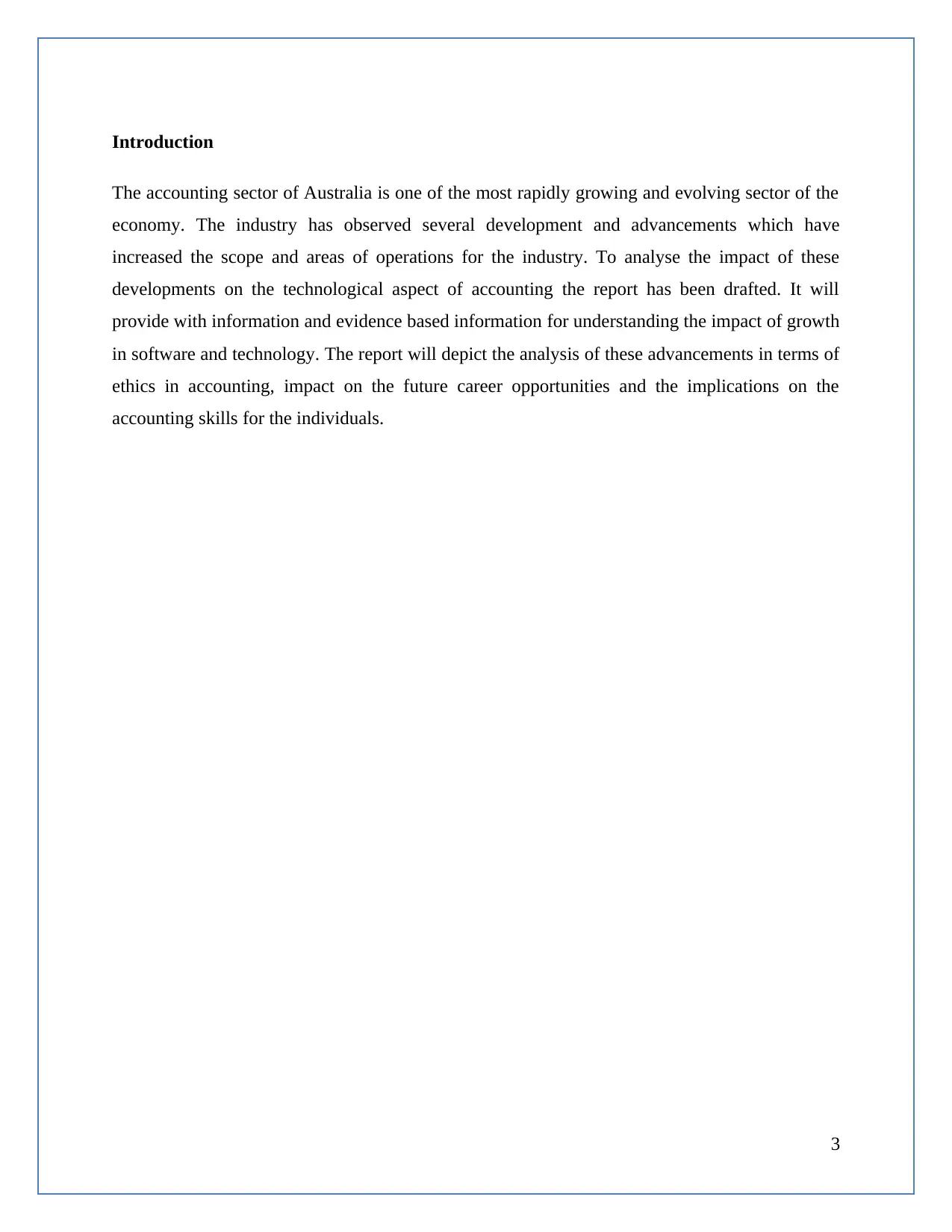
Introduction
The accounting sector of Australia is one of the most rapidly growing and evolving sector of the
economy. The industry has observed several development and advancements which have
increased the scope and areas of operations for the industry. To analyse the impact of these
developments on the technological aspect of accounting the report has been drafted. It will
provide with information and evidence based information for understanding the impact of growth
in software and technology. The report will depict the analysis of these advancements in terms of
ethics in accounting, impact on the future career opportunities and the implications on the
accounting skills for the individuals.
3
The accounting sector of Australia is one of the most rapidly growing and evolving sector of the
economy. The industry has observed several development and advancements which have
increased the scope and areas of operations for the industry. To analyse the impact of these
developments on the technological aspect of accounting the report has been drafted. It will
provide with information and evidence based information for understanding the impact of growth
in software and technology. The report will depict the analysis of these advancements in terms of
ethics in accounting, impact on the future career opportunities and the implications on the
accounting skills for the individuals.
3
⊘ This is a preview!⊘
Do you want full access?
Subscribe today to unlock all pages.

Trusted by 1+ million students worldwide
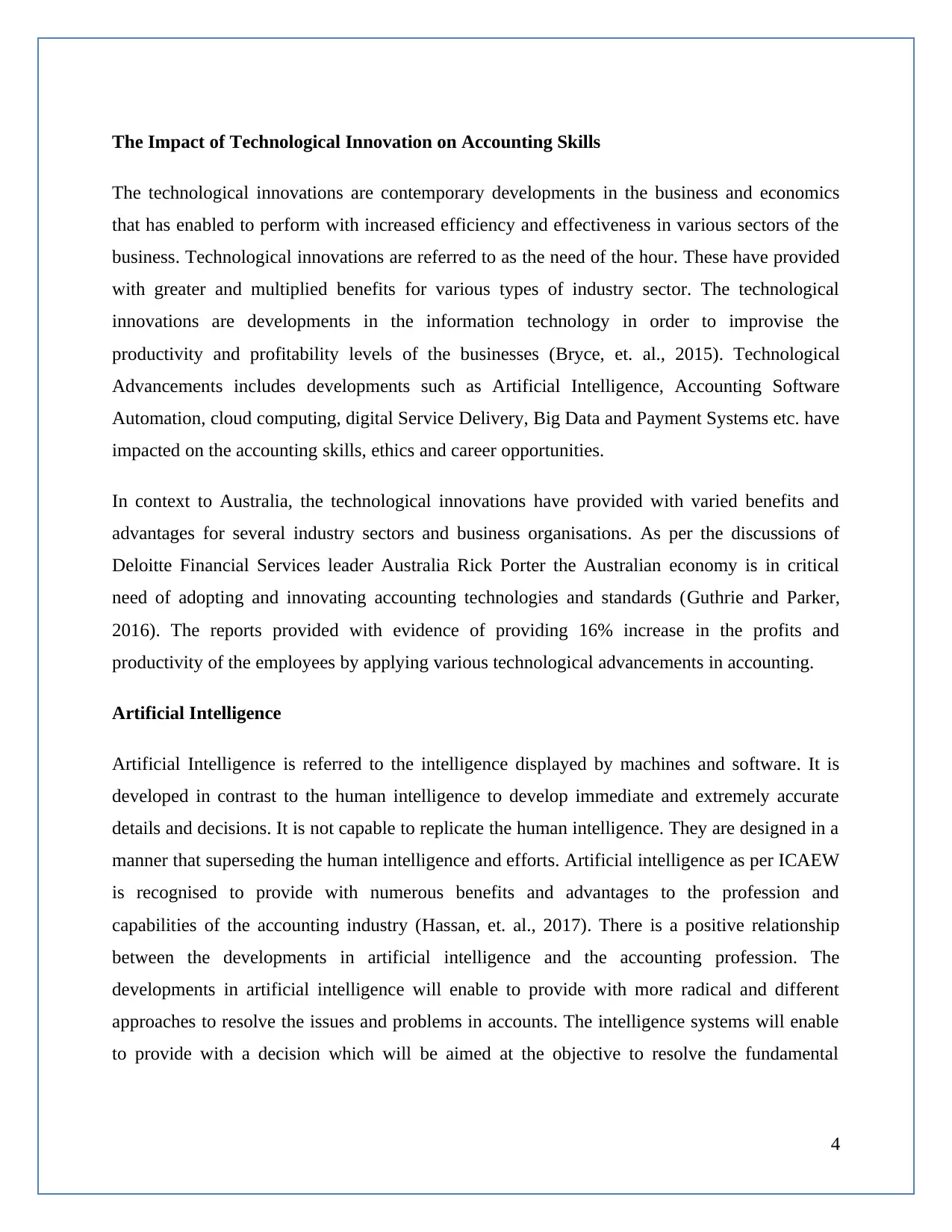
The Impact of Technological Innovation on Accounting Skills
The technological innovations are contemporary developments in the business and economics
that has enabled to perform with increased efficiency and effectiveness in various sectors of the
business. Technological innovations are referred to as the need of the hour. These have provided
with greater and multiplied benefits for various types of industry sector. The technological
innovations are developments in the information technology in order to improvise the
productivity and profitability levels of the businesses (Bryce, et. al., 2015). Technological
Advancements includes developments such as Artificial Intelligence, Accounting Software
Automation, cloud computing, digital Service Delivery, Big Data and Payment Systems etc. have
impacted on the accounting skills, ethics and career opportunities.
In context to Australia, the technological innovations have provided with varied benefits and
advantages for several industry sectors and business organisations. As per the discussions of
Deloitte Financial Services leader Australia Rick Porter the Australian economy is in critical
need of adopting and innovating accounting technologies and standards (Guthrie and Parker,
2016). The reports provided with evidence of providing 16% increase in the profits and
productivity of the employees by applying various technological advancements in accounting.
Artificial Intelligence
Artificial Intelligence is referred to the intelligence displayed by machines and software. It is
developed in contrast to the human intelligence to develop immediate and extremely accurate
details and decisions. It is not capable to replicate the human intelligence. They are designed in a
manner that superseding the human intelligence and efforts. Artificial intelligence as per ICAEW
is recognised to provide with numerous benefits and advantages to the profession and
capabilities of the accounting industry (Hassan, et. al., 2017). There is a positive relationship
between the developments in artificial intelligence and the accounting profession. The
developments in artificial intelligence will enable to provide with more radical and different
approaches to resolve the issues and problems in accounts. The intelligence systems will enable
to provide with a decision which will be aimed at the objective to resolve the fundamental
4
The technological innovations are contemporary developments in the business and economics
that has enabled to perform with increased efficiency and effectiveness in various sectors of the
business. Technological innovations are referred to as the need of the hour. These have provided
with greater and multiplied benefits for various types of industry sector. The technological
innovations are developments in the information technology in order to improvise the
productivity and profitability levels of the businesses (Bryce, et. al., 2015). Technological
Advancements includes developments such as Artificial Intelligence, Accounting Software
Automation, cloud computing, digital Service Delivery, Big Data and Payment Systems etc. have
impacted on the accounting skills, ethics and career opportunities.
In context to Australia, the technological innovations have provided with varied benefits and
advantages for several industry sectors and business organisations. As per the discussions of
Deloitte Financial Services leader Australia Rick Porter the Australian economy is in critical
need of adopting and innovating accounting technologies and standards (Guthrie and Parker,
2016). The reports provided with evidence of providing 16% increase in the profits and
productivity of the employees by applying various technological advancements in accounting.
Artificial Intelligence
Artificial Intelligence is referred to the intelligence displayed by machines and software. It is
developed in contrast to the human intelligence to develop immediate and extremely accurate
details and decisions. It is not capable to replicate the human intelligence. They are designed in a
manner that superseding the human intelligence and efforts. Artificial intelligence as per ICAEW
is recognised to provide with numerous benefits and advantages to the profession and
capabilities of the accounting industry (Hassan, et. al., 2017). There is a positive relationship
between the developments in artificial intelligence and the accounting profession. The
developments in artificial intelligence will enable to provide with more radical and different
approaches to resolve the issues and problems in accounts. The intelligence systems will enable
to provide with a decision which will be aimed at the objective to resolve the fundamental
4
Paraphrase This Document
Need a fresh take? Get an instant paraphrase of this document with our AI Paraphraser
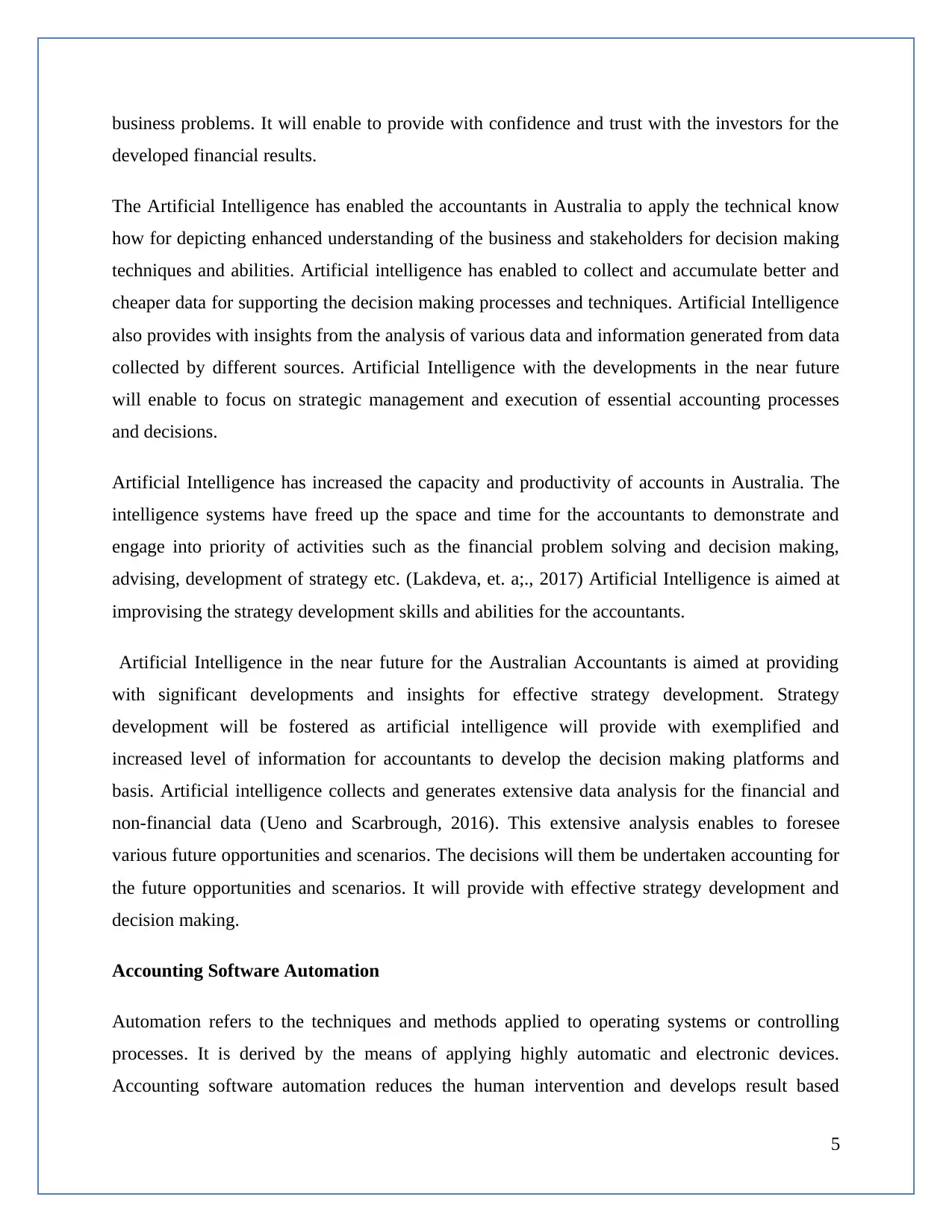
business problems. It will enable to provide with confidence and trust with the investors for the
developed financial results.
The Artificial Intelligence has enabled the accountants in Australia to apply the technical know
how for depicting enhanced understanding of the business and stakeholders for decision making
techniques and abilities. Artificial intelligence has enabled to collect and accumulate better and
cheaper data for supporting the decision making processes and techniques. Artificial Intelligence
also provides with insights from the analysis of various data and information generated from data
collected by different sources. Artificial Intelligence with the developments in the near future
will enable to focus on strategic management and execution of essential accounting processes
and decisions.
Artificial Intelligence has increased the capacity and productivity of accounts in Australia. The
intelligence systems have freed up the space and time for the accountants to demonstrate and
engage into priority of activities such as the financial problem solving and decision making,
advising, development of strategy etc. (Lakdeva, et. a;., 2017) Artificial Intelligence is aimed at
improvising the strategy development skills and abilities for the accountants.
Artificial Intelligence in the near future for the Australian Accountants is aimed at providing
with significant developments and insights for effective strategy development. Strategy
development will be fostered as artificial intelligence will provide with exemplified and
increased level of information for accountants to develop the decision making platforms and
basis. Artificial intelligence collects and generates extensive data analysis for the financial and
non-financial data (Ueno and Scarbrough, 2016). This extensive analysis enables to foresee
various future opportunities and scenarios. The decisions will them be undertaken accounting for
the future opportunities and scenarios. It will provide with effective strategy development and
decision making.
Accounting Software Automation
Automation refers to the techniques and methods applied to operating systems or controlling
processes. It is derived by the means of applying highly automatic and electronic devices.
Accounting software automation reduces the human intervention and develops result based
5
developed financial results.
The Artificial Intelligence has enabled the accountants in Australia to apply the technical know
how for depicting enhanced understanding of the business and stakeholders for decision making
techniques and abilities. Artificial intelligence has enabled to collect and accumulate better and
cheaper data for supporting the decision making processes and techniques. Artificial Intelligence
also provides with insights from the analysis of various data and information generated from data
collected by different sources. Artificial Intelligence with the developments in the near future
will enable to focus on strategic management and execution of essential accounting processes
and decisions.
Artificial Intelligence has increased the capacity and productivity of accounts in Australia. The
intelligence systems have freed up the space and time for the accountants to demonstrate and
engage into priority of activities such as the financial problem solving and decision making,
advising, development of strategy etc. (Lakdeva, et. a;., 2017) Artificial Intelligence is aimed at
improvising the strategy development skills and abilities for the accountants.
Artificial Intelligence in the near future for the Australian Accountants is aimed at providing
with significant developments and insights for effective strategy development. Strategy
development will be fostered as artificial intelligence will provide with exemplified and
increased level of information for accountants to develop the decision making platforms and
basis. Artificial intelligence collects and generates extensive data analysis for the financial and
non-financial data (Ueno and Scarbrough, 2016). This extensive analysis enables to foresee
various future opportunities and scenarios. The decisions will them be undertaken accounting for
the future opportunities and scenarios. It will provide with effective strategy development and
decision making.
Accounting Software Automation
Automation refers to the techniques and methods applied to operating systems or controlling
processes. It is derived by the means of applying highly automatic and electronic devices.
Accounting software automation reduces the human intervention and develops result based
5
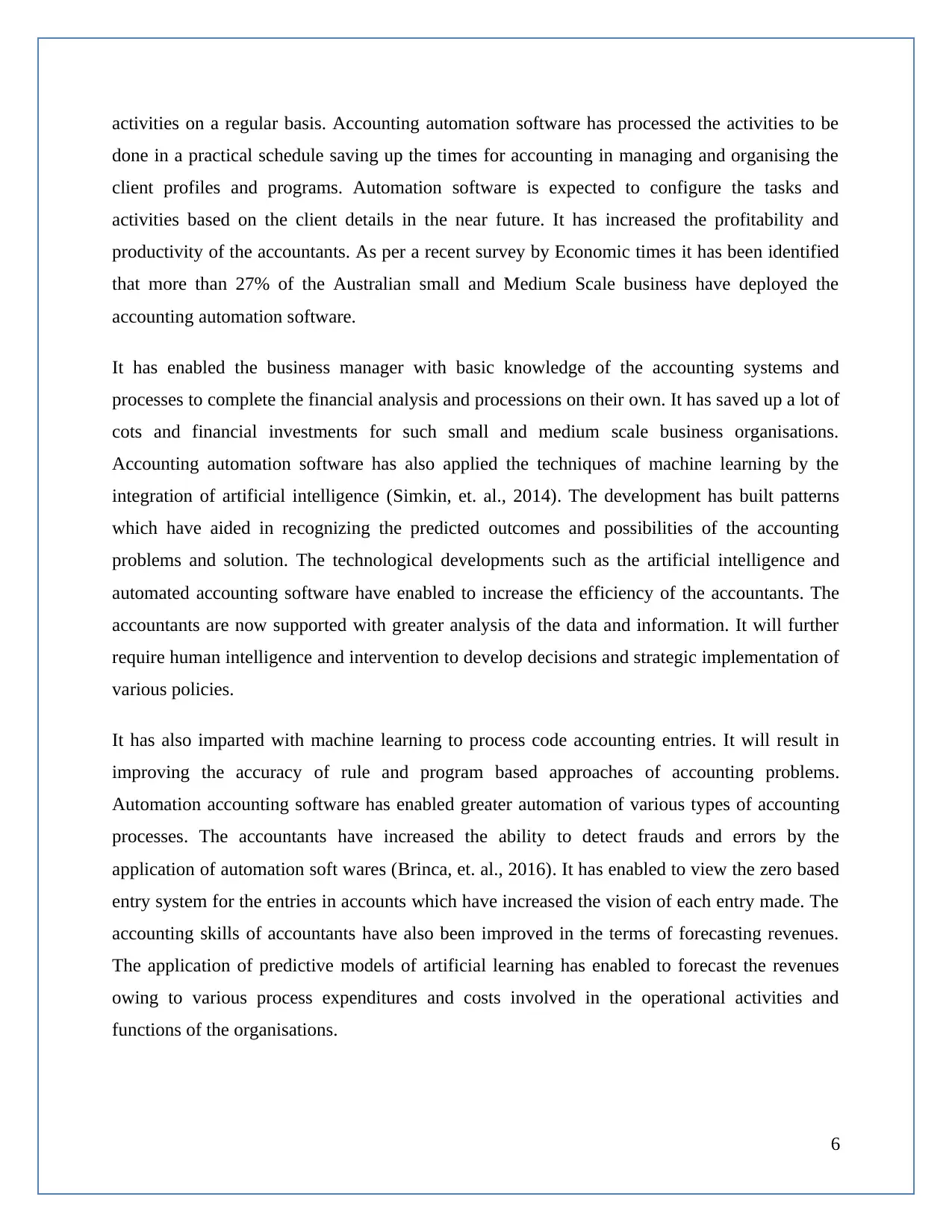
activities on a regular basis. Accounting automation software has processed the activities to be
done in a practical schedule saving up the times for accounting in managing and organising the
client profiles and programs. Automation software is expected to configure the tasks and
activities based on the client details in the near future. It has increased the profitability and
productivity of the accountants. As per a recent survey by Economic times it has been identified
that more than 27% of the Australian small and Medium Scale business have deployed the
accounting automation software.
It has enabled the business manager with basic knowledge of the accounting systems and
processes to complete the financial analysis and processions on their own. It has saved up a lot of
cots and financial investments for such small and medium scale business organisations.
Accounting automation software has also applied the techniques of machine learning by the
integration of artificial intelligence (Simkin, et. al., 2014). The development has built patterns
which have aided in recognizing the predicted outcomes and possibilities of the accounting
problems and solution. The technological developments such as the artificial intelligence and
automated accounting software have enabled to increase the efficiency of the accountants. The
accountants are now supported with greater analysis of the data and information. It will further
require human intelligence and intervention to develop decisions and strategic implementation of
various policies.
It has also imparted with machine learning to process code accounting entries. It will result in
improving the accuracy of rule and program based approaches of accounting problems.
Automation accounting software has enabled greater automation of various types of accounting
processes. The accountants have increased the ability to detect frauds and errors by the
application of automation soft wares (Brinca, et. al., 2016). It has enabled to view the zero based
entry system for the entries in accounts which have increased the vision of each entry made. The
accounting skills of accountants have also been improved in the terms of forecasting revenues.
The application of predictive models of artificial learning has enabled to forecast the revenues
owing to various process expenditures and costs involved in the operational activities and
functions of the organisations.
6
done in a practical schedule saving up the times for accounting in managing and organising the
client profiles and programs. Automation software is expected to configure the tasks and
activities based on the client details in the near future. It has increased the profitability and
productivity of the accountants. As per a recent survey by Economic times it has been identified
that more than 27% of the Australian small and Medium Scale business have deployed the
accounting automation software.
It has enabled the business manager with basic knowledge of the accounting systems and
processes to complete the financial analysis and processions on their own. It has saved up a lot of
cots and financial investments for such small and medium scale business organisations.
Accounting automation software has also applied the techniques of machine learning by the
integration of artificial intelligence (Simkin, et. al., 2014). The development has built patterns
which have aided in recognizing the predicted outcomes and possibilities of the accounting
problems and solution. The technological developments such as the artificial intelligence and
automated accounting software have enabled to increase the efficiency of the accountants. The
accountants are now supported with greater analysis of the data and information. It will further
require human intelligence and intervention to develop decisions and strategic implementation of
various policies.
It has also imparted with machine learning to process code accounting entries. It will result in
improving the accuracy of rule and program based approaches of accounting problems.
Automation accounting software has enabled greater automation of various types of accounting
processes. The accountants have increased the ability to detect frauds and errors by the
application of automation soft wares (Brinca, et. al., 2016). It has enabled to view the zero based
entry system for the entries in accounts which have increased the vision of each entry made. The
accounting skills of accountants have also been improved in the terms of forecasting revenues.
The application of predictive models of artificial learning has enabled to forecast the revenues
owing to various process expenditures and costs involved in the operational activities and
functions of the organisations.
6
⊘ This is a preview!⊘
Do you want full access?
Subscribe today to unlock all pages.

Trusted by 1+ million students worldwide

7
Paraphrase This Document
Need a fresh take? Get an instant paraphrase of this document with our AI Paraphraser
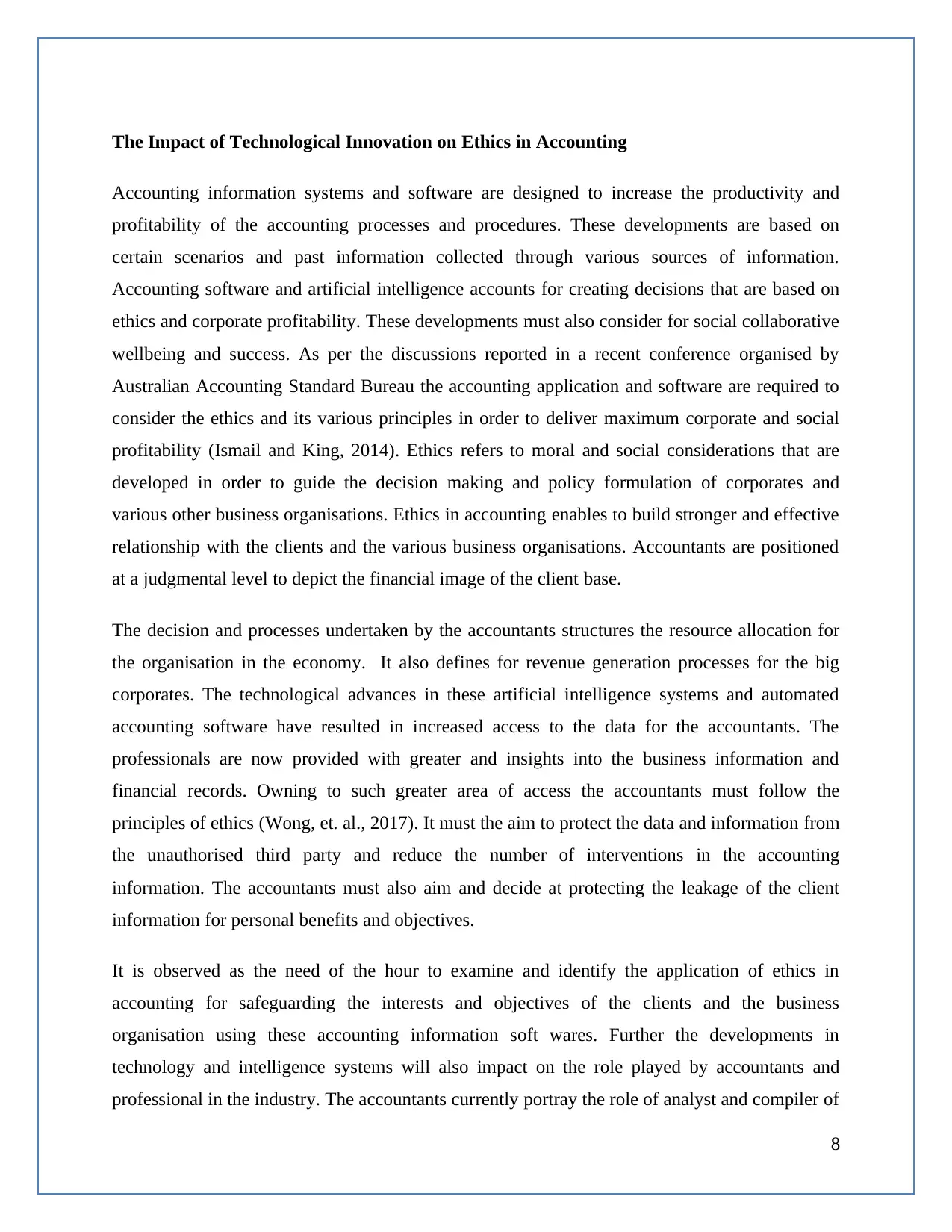
The Impact of Technological Innovation on Ethics in Accounting
Accounting information systems and software are designed to increase the productivity and
profitability of the accounting processes and procedures. These developments are based on
certain scenarios and past information collected through various sources of information.
Accounting software and artificial intelligence accounts for creating decisions that are based on
ethics and corporate profitability. These developments must also consider for social collaborative
wellbeing and success. As per the discussions reported in a recent conference organised by
Australian Accounting Standard Bureau the accounting application and software are required to
consider the ethics and its various principles in order to deliver maximum corporate and social
profitability (Ismail and King, 2014). Ethics refers to moral and social considerations that are
developed in order to guide the decision making and policy formulation of corporates and
various other business organisations. Ethics in accounting enables to build stronger and effective
relationship with the clients and the various business organisations. Accountants are positioned
at a judgmental level to depict the financial image of the client base.
The decision and processes undertaken by the accountants structures the resource allocation for
the organisation in the economy. It also defines for revenue generation processes for the big
corporates. The technological advances in these artificial intelligence systems and automated
accounting software have resulted in increased access to the data for the accountants. The
professionals are now provided with greater and insights into the business information and
financial records. Owning to such greater area of access the accountants must follow the
principles of ethics (Wong, et. al., 2017). It must the aim to protect the data and information from
the unauthorised third party and reduce the number of interventions in the accounting
information. The accountants must also aim and decide at protecting the leakage of the client
information for personal benefits and objectives.
It is observed as the need of the hour to examine and identify the application of ethics in
accounting for safeguarding the interests and objectives of the clients and the business
organisation using these accounting information soft wares. Further the developments in
technology and intelligence systems will also impact on the role played by accountants and
professional in the industry. The accountants currently portray the role of analyst and compiler of
8
Accounting information systems and software are designed to increase the productivity and
profitability of the accounting processes and procedures. These developments are based on
certain scenarios and past information collected through various sources of information.
Accounting software and artificial intelligence accounts for creating decisions that are based on
ethics and corporate profitability. These developments must also consider for social collaborative
wellbeing and success. As per the discussions reported in a recent conference organised by
Australian Accounting Standard Bureau the accounting application and software are required to
consider the ethics and its various principles in order to deliver maximum corporate and social
profitability (Ismail and King, 2014). Ethics refers to moral and social considerations that are
developed in order to guide the decision making and policy formulation of corporates and
various other business organisations. Ethics in accounting enables to build stronger and effective
relationship with the clients and the various business organisations. Accountants are positioned
at a judgmental level to depict the financial image of the client base.
The decision and processes undertaken by the accountants structures the resource allocation for
the organisation in the economy. It also defines for revenue generation processes for the big
corporates. The technological advances in these artificial intelligence systems and automated
accounting software have resulted in increased access to the data for the accountants. The
professionals are now provided with greater and insights into the business information and
financial records. Owning to such greater area of access the accountants must follow the
principles of ethics (Wong, et. al., 2017). It must the aim to protect the data and information from
the unauthorised third party and reduce the number of interventions in the accounting
information. The accountants must also aim and decide at protecting the leakage of the client
information for personal benefits and objectives.
It is observed as the need of the hour to examine and identify the application of ethics in
accounting for safeguarding the interests and objectives of the clients and the business
organisation using these accounting information soft wares. Further the developments in
technology and intelligence systems will also impact on the role played by accountants and
professional in the industry. The accountants currently portray the role of analyst and compiler of
8
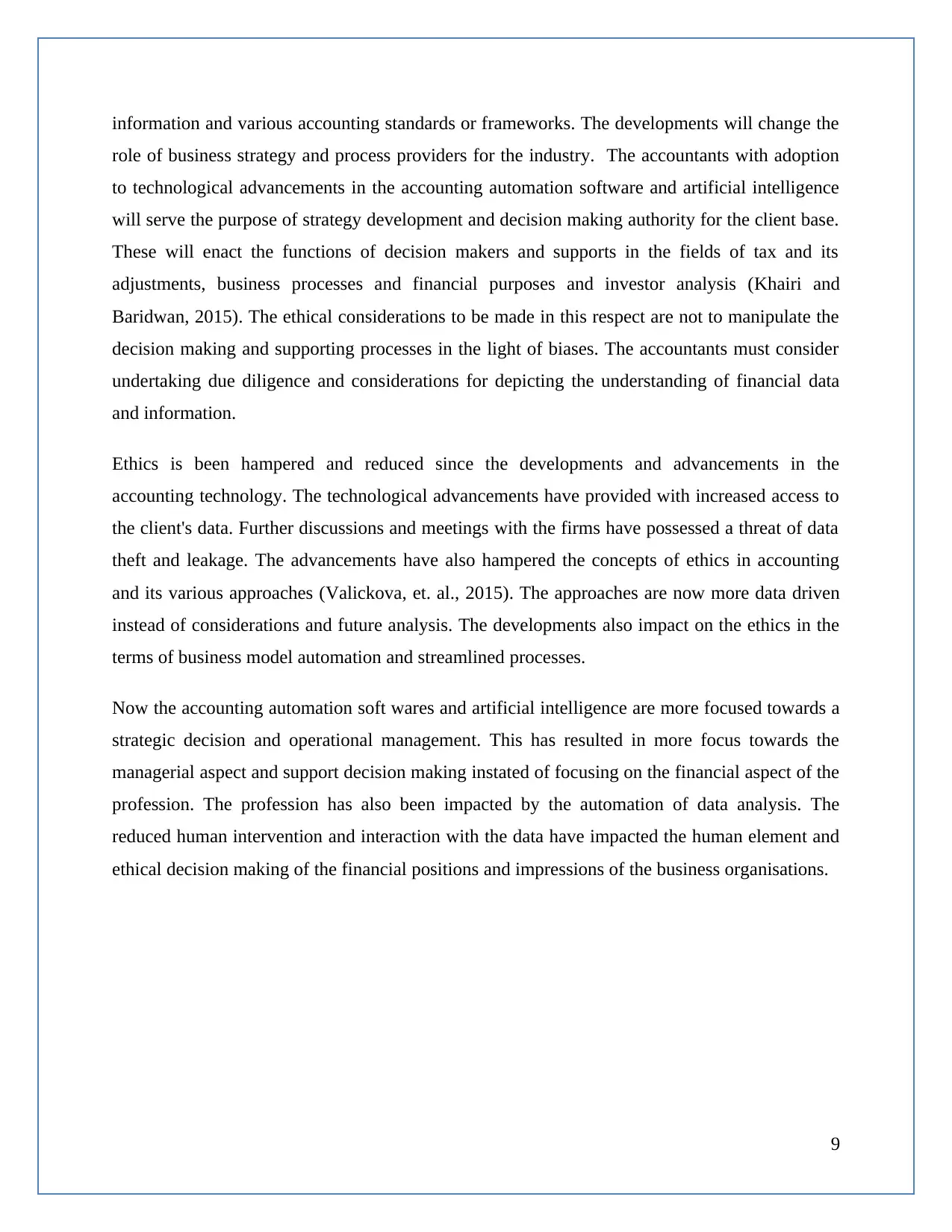
information and various accounting standards or frameworks. The developments will change the
role of business strategy and process providers for the industry. The accountants with adoption
to technological advancements in the accounting automation software and artificial intelligence
will serve the purpose of strategy development and decision making authority for the client base.
These will enact the functions of decision makers and supports in the fields of tax and its
adjustments, business processes and financial purposes and investor analysis (Khairi and
Baridwan, 2015). The ethical considerations to be made in this respect are not to manipulate the
decision making and supporting processes in the light of biases. The accountants must consider
undertaking due diligence and considerations for depicting the understanding of financial data
and information.
Ethics is been hampered and reduced since the developments and advancements in the
accounting technology. The technological advancements have provided with increased access to
the client's data. Further discussions and meetings with the firms have possessed a threat of data
theft and leakage. The advancements have also hampered the concepts of ethics in accounting
and its various approaches (Valickova, et. al., 2015). The approaches are now more data driven
instead of considerations and future analysis. The developments also impact on the ethics in the
terms of business model automation and streamlined processes.
Now the accounting automation soft wares and artificial intelligence are more focused towards a
strategic decision and operational management. This has resulted in more focus towards the
managerial aspect and support decision making instated of focusing on the financial aspect of the
profession. The profession has also been impacted by the automation of data analysis. The
reduced human intervention and interaction with the data have impacted the human element and
ethical decision making of the financial positions and impressions of the business organisations.
9
role of business strategy and process providers for the industry. The accountants with adoption
to technological advancements in the accounting automation software and artificial intelligence
will serve the purpose of strategy development and decision making authority for the client base.
These will enact the functions of decision makers and supports in the fields of tax and its
adjustments, business processes and financial purposes and investor analysis (Khairi and
Baridwan, 2015). The ethical considerations to be made in this respect are not to manipulate the
decision making and supporting processes in the light of biases. The accountants must consider
undertaking due diligence and considerations for depicting the understanding of financial data
and information.
Ethics is been hampered and reduced since the developments and advancements in the
accounting technology. The technological advancements have provided with increased access to
the client's data. Further discussions and meetings with the firms have possessed a threat of data
theft and leakage. The advancements have also hampered the concepts of ethics in accounting
and its various approaches (Valickova, et. al., 2015). The approaches are now more data driven
instead of considerations and future analysis. The developments also impact on the ethics in the
terms of business model automation and streamlined processes.
Now the accounting automation soft wares and artificial intelligence are more focused towards a
strategic decision and operational management. This has resulted in more focus towards the
managerial aspect and support decision making instated of focusing on the financial aspect of the
profession. The profession has also been impacted by the automation of data analysis. The
reduced human intervention and interaction with the data have impacted the human element and
ethical decision making of the financial positions and impressions of the business organisations.
9
⊘ This is a preview!⊘
Do you want full access?
Subscribe today to unlock all pages.

Trusted by 1+ million students worldwide
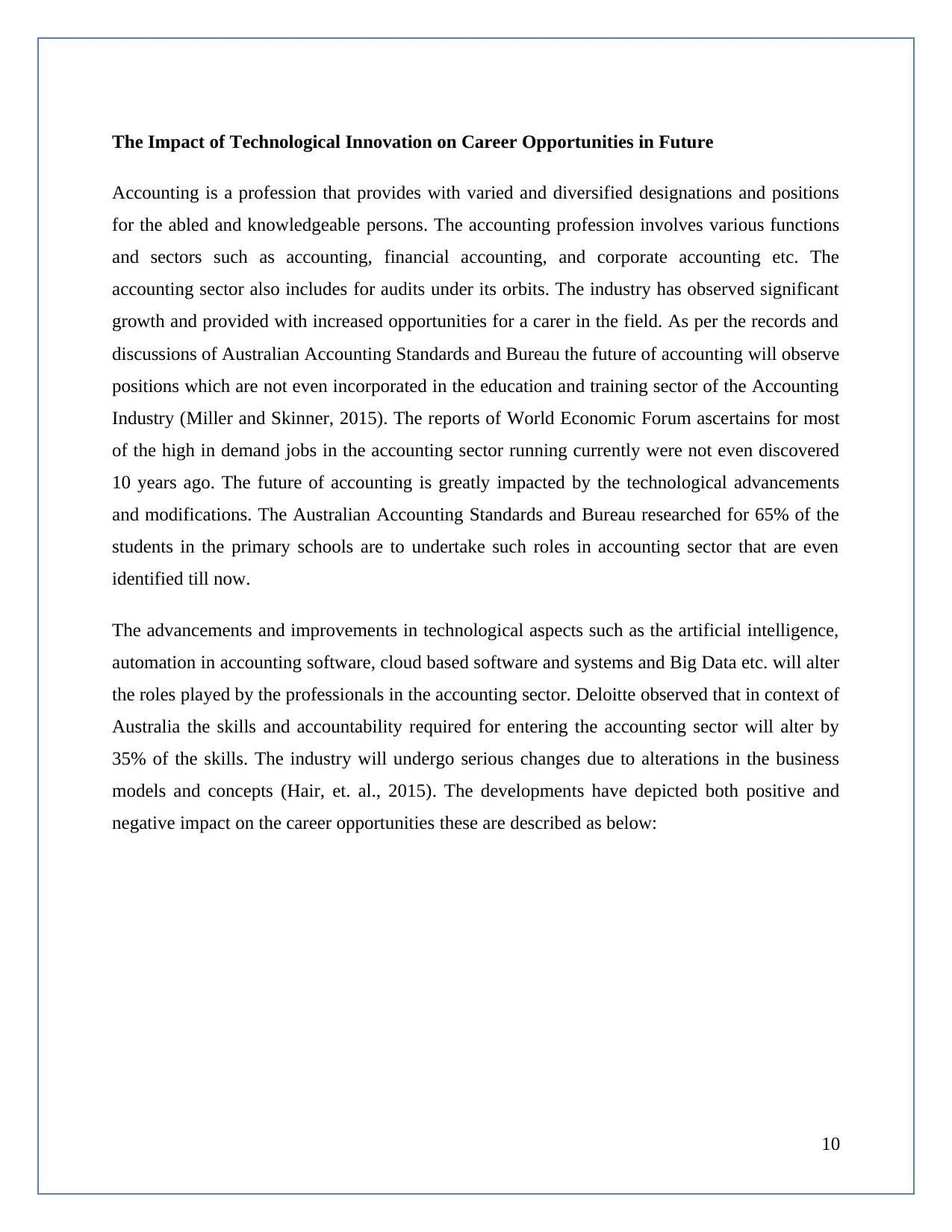
The Impact of Technological Innovation on Career Opportunities in Future
Accounting is a profession that provides with varied and diversified designations and positions
for the abled and knowledgeable persons. The accounting profession involves various functions
and sectors such as accounting, financial accounting, and corporate accounting etc. The
accounting sector also includes for audits under its orbits. The industry has observed significant
growth and provided with increased opportunities for a carer in the field. As per the records and
discussions of Australian Accounting Standards and Bureau the future of accounting will observe
positions which are not even incorporated in the education and training sector of the Accounting
Industry (Miller and Skinner, 2015). The reports of World Economic Forum ascertains for most
of the high in demand jobs in the accounting sector running currently were not even discovered
10 years ago. The future of accounting is greatly impacted by the technological advancements
and modifications. The Australian Accounting Standards and Bureau researched for 65% of the
students in the primary schools are to undertake such roles in accounting sector that are even
identified till now.
The advancements and improvements in technological aspects such as the artificial intelligence,
automation in accounting software, cloud based software and systems and Big Data etc. will alter
the roles played by the professionals in the accounting sector. Deloitte observed that in context of
Australia the skills and accountability required for entering the accounting sector will alter by
35% of the skills. The industry will undergo serious changes due to alterations in the business
models and concepts (Hair, et. al., 2015). The developments have depicted both positive and
negative impact on the career opportunities these are described as below:
10
Accounting is a profession that provides with varied and diversified designations and positions
for the abled and knowledgeable persons. The accounting profession involves various functions
and sectors such as accounting, financial accounting, and corporate accounting etc. The
accounting sector also includes for audits under its orbits. The industry has observed significant
growth and provided with increased opportunities for a carer in the field. As per the records and
discussions of Australian Accounting Standards and Bureau the future of accounting will observe
positions which are not even incorporated in the education and training sector of the Accounting
Industry (Miller and Skinner, 2015). The reports of World Economic Forum ascertains for most
of the high in demand jobs in the accounting sector running currently were not even discovered
10 years ago. The future of accounting is greatly impacted by the technological advancements
and modifications. The Australian Accounting Standards and Bureau researched for 65% of the
students in the primary schools are to undertake such roles in accounting sector that are even
identified till now.
The advancements and improvements in technological aspects such as the artificial intelligence,
automation in accounting software, cloud based software and systems and Big Data etc. will alter
the roles played by the professionals in the accounting sector. Deloitte observed that in context of
Australia the skills and accountability required for entering the accounting sector will alter by
35% of the skills. The industry will undergo serious changes due to alterations in the business
models and concepts (Hair, et. al., 2015). The developments have depicted both positive and
negative impact on the career opportunities these are described as below:
10
Paraphrase This Document
Need a fresh take? Get an instant paraphrase of this document with our AI Paraphraser
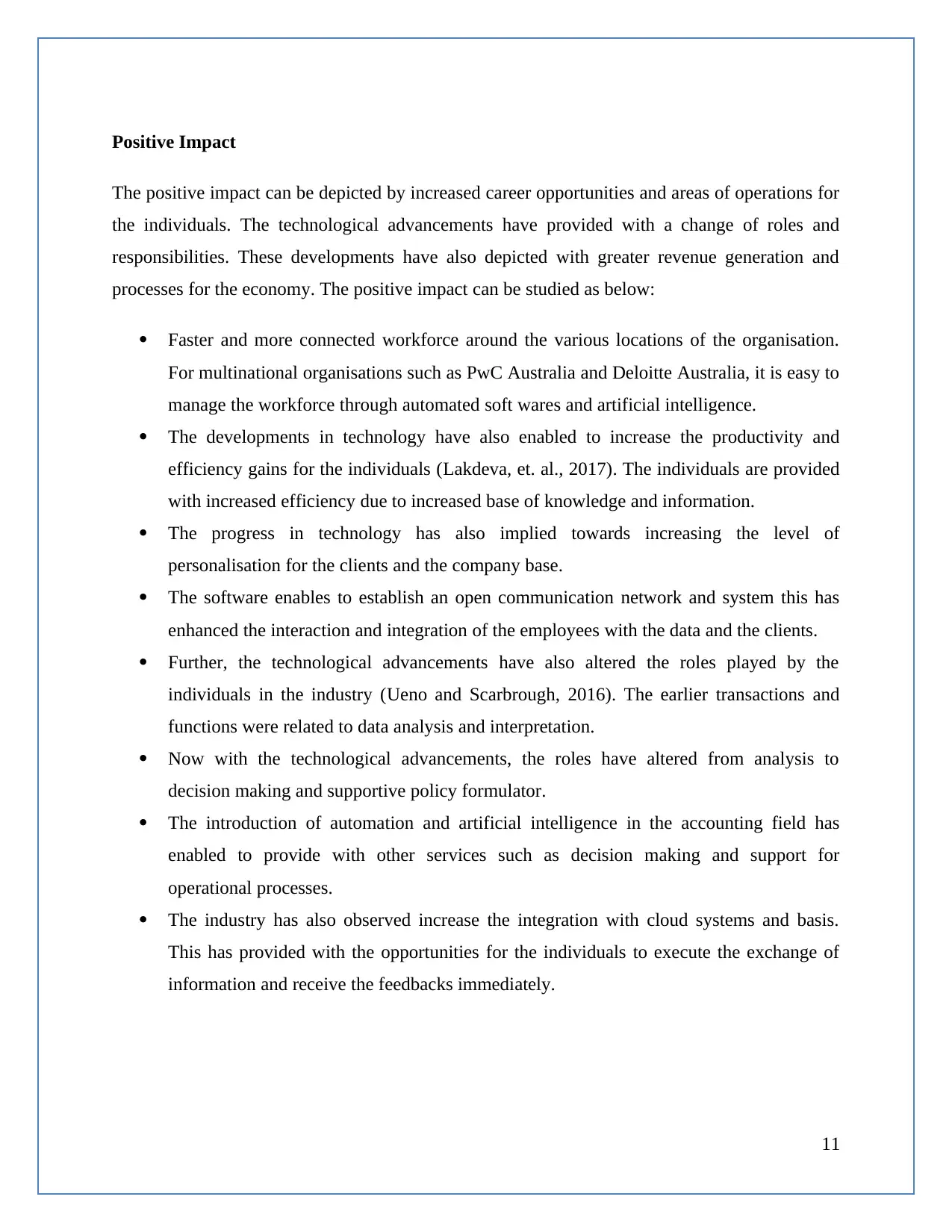
Positive Impact
The positive impact can be depicted by increased career opportunities and areas of operations for
the individuals. The technological advancements have provided with a change of roles and
responsibilities. These developments have also depicted with greater revenue generation and
processes for the economy. The positive impact can be studied as below:
Faster and more connected workforce around the various locations of the organisation.
For multinational organisations such as PwC Australia and Deloitte Australia, it is easy to
manage the workforce through automated soft wares and artificial intelligence.
The developments in technology have also enabled to increase the productivity and
efficiency gains for the individuals (Lakdeva, et. al., 2017). The individuals are provided
with increased efficiency due to increased base of knowledge and information.
The progress in technology has also implied towards increasing the level of
personalisation for the clients and the company base.
The software enables to establish an open communication network and system this has
enhanced the interaction and integration of the employees with the data and the clients.
Further, the technological advancements have also altered the roles played by the
individuals in the industry (Ueno and Scarbrough, 2016). The earlier transactions and
functions were related to data analysis and interpretation.
Now with the technological advancements, the roles have altered from analysis to
decision making and supportive policy formulator.
The introduction of automation and artificial intelligence in the accounting field has
enabled to provide with other services such as decision making and support for
operational processes.
The industry has also observed increase the integration with cloud systems and basis.
This has provided with the opportunities for the individuals to execute the exchange of
information and receive the feedbacks immediately.
11
The positive impact can be depicted by increased career opportunities and areas of operations for
the individuals. The technological advancements have provided with a change of roles and
responsibilities. These developments have also depicted with greater revenue generation and
processes for the economy. The positive impact can be studied as below:
Faster and more connected workforce around the various locations of the organisation.
For multinational organisations such as PwC Australia and Deloitte Australia, it is easy to
manage the workforce through automated soft wares and artificial intelligence.
The developments in technology have also enabled to increase the productivity and
efficiency gains for the individuals (Lakdeva, et. al., 2017). The individuals are provided
with increased efficiency due to increased base of knowledge and information.
The progress in technology has also implied towards increasing the level of
personalisation for the clients and the company base.
The software enables to establish an open communication network and system this has
enhanced the interaction and integration of the employees with the data and the clients.
Further, the technological advancements have also altered the roles played by the
individuals in the industry (Ueno and Scarbrough, 2016). The earlier transactions and
functions were related to data analysis and interpretation.
Now with the technological advancements, the roles have altered from analysis to
decision making and supportive policy formulator.
The introduction of automation and artificial intelligence in the accounting field has
enabled to provide with other services such as decision making and support for
operational processes.
The industry has also observed increase the integration with cloud systems and basis.
This has provided with the opportunities for the individuals to execute the exchange of
information and receive the feedbacks immediately.
11
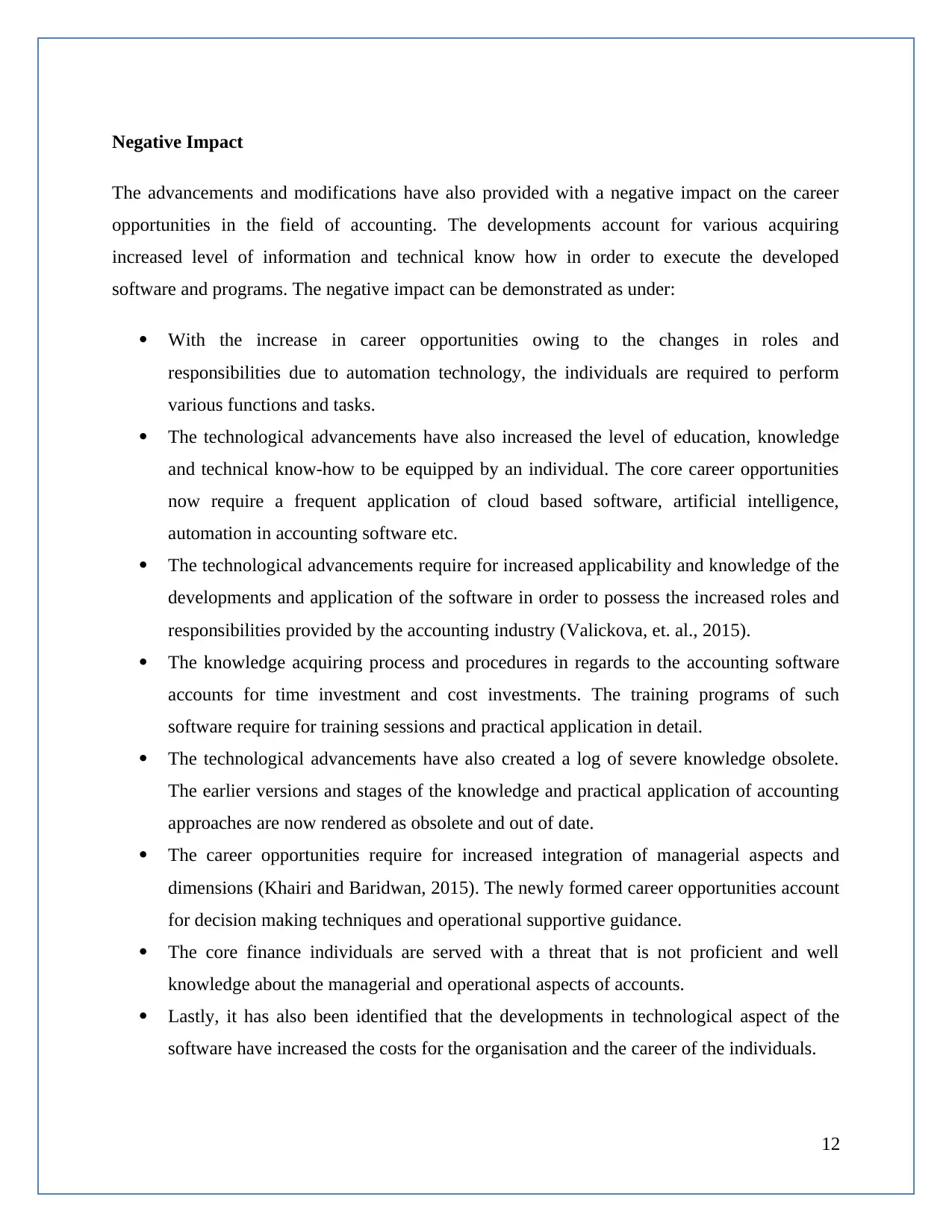
Negative Impact
The advancements and modifications have also provided with a negative impact on the career
opportunities in the field of accounting. The developments account for various acquiring
increased level of information and technical know how in order to execute the developed
software and programs. The negative impact can be demonstrated as under:
With the increase in career opportunities owing to the changes in roles and
responsibilities due to automation technology, the individuals are required to perform
various functions and tasks.
The technological advancements have also increased the level of education, knowledge
and technical know-how to be equipped by an individual. The core career opportunities
now require a frequent application of cloud based software, artificial intelligence,
automation in accounting software etc.
The technological advancements require for increased applicability and knowledge of the
developments and application of the software in order to possess the increased roles and
responsibilities provided by the accounting industry (Valickova, et. al., 2015).
The knowledge acquiring process and procedures in regards to the accounting software
accounts for time investment and cost investments. The training programs of such
software require for training sessions and practical application in detail.
The technological advancements have also created a log of severe knowledge obsolete.
The earlier versions and stages of the knowledge and practical application of accounting
approaches are now rendered as obsolete and out of date.
The career opportunities require for increased integration of managerial aspects and
dimensions (Khairi and Baridwan, 2015). The newly formed career opportunities account
for decision making techniques and operational supportive guidance.
The core finance individuals are served with a threat that is not proficient and well
knowledge about the managerial and operational aspects of accounts.
Lastly, it has also been identified that the developments in technological aspect of the
software have increased the costs for the organisation and the career of the individuals.
12
The advancements and modifications have also provided with a negative impact on the career
opportunities in the field of accounting. The developments account for various acquiring
increased level of information and technical know how in order to execute the developed
software and programs. The negative impact can be demonstrated as under:
With the increase in career opportunities owing to the changes in roles and
responsibilities due to automation technology, the individuals are required to perform
various functions and tasks.
The technological advancements have also increased the level of education, knowledge
and technical know-how to be equipped by an individual. The core career opportunities
now require a frequent application of cloud based software, artificial intelligence,
automation in accounting software etc.
The technological advancements require for increased applicability and knowledge of the
developments and application of the software in order to possess the increased roles and
responsibilities provided by the accounting industry (Valickova, et. al., 2015).
The knowledge acquiring process and procedures in regards to the accounting software
accounts for time investment and cost investments. The training programs of such
software require for training sessions and practical application in detail.
The technological advancements have also created a log of severe knowledge obsolete.
The earlier versions and stages of the knowledge and practical application of accounting
approaches are now rendered as obsolete and out of date.
The career opportunities require for increased integration of managerial aspects and
dimensions (Khairi and Baridwan, 2015). The newly formed career opportunities account
for decision making techniques and operational supportive guidance.
The core finance individuals are served with a threat that is not proficient and well
knowledge about the managerial and operational aspects of accounts.
Lastly, it has also been identified that the developments in technological aspect of the
software have increased the costs for the organisation and the career of the individuals.
12
⊘ This is a preview!⊘
Do you want full access?
Subscribe today to unlock all pages.

Trusted by 1+ million students worldwide
1 out of 16
Related Documents
Your All-in-One AI-Powered Toolkit for Academic Success.
+13062052269
info@desklib.com
Available 24*7 on WhatsApp / Email
![[object Object]](/_next/static/media/star-bottom.7253800d.svg)
Unlock your academic potential
Copyright © 2020–2026 A2Z Services. All Rights Reserved. Developed and managed by ZUCOL.





